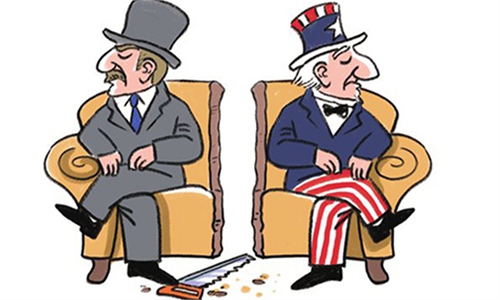COMMENTS / EXPERT ASSESSMENT
Merkel sets example for successor to continue pragmatic ties

Illustration: Xia Qing/Global Times
German Chancellor Angela Merkel, after 16 years at the helm, is leaving her office in two weeks after the federal election. During the election campaign, her potential successors pledged to part course with her by being tougher with China, which raises concerns if the vital and mutual beneficial cooperation between the two countries will face headwinds.China-German relations have witnessed high-level development during Merkel's 16 years in power. Based on efficient communication and pragmatic cooperation, bilateral relations have achieved multiple milestones, from the setup of the China-Germany inter-governmental consultation mechanism, the establishment of the bilateral comprehensive strategic partnership, to the completion of negotiation on the EU-China Comprehensive Agreement for Investment.
As a result, China and Germany have built a highly successful model for economic and trade cooperation. It is worth pointing out that, while Germany's trade with the US dropped by 10 percent last year due to the impact of the COVID-19 pandemic, German trade with China recorded 3 percent year-on-year positive growth. China has been Germany's largest trading partner for five consecutive years.
And, it is truly a win-win relationship. It was the huge Chinese market that provided a crucial opportunity for German companies to survive and grow amid a once-in-a-century global public health crisis.
China, in 2020, surpassed the US and became the EU's largest trading partner. From France's luxury brand giant LVMH to German carmaker BMW and Audi, European companies have witnessed the Chinese market is increasingly important to them.
According to a survey conducted by the European Union Chamber of Commerce in China in June, 60 percent of the European companies surveyed plan to expand their operations in China in 2021. About half of respondents said profit margins in China were higher than the global average, up from 38 percent a year ago.
Facts speak louder than words. Tangible profits brought about by promoting pragmatic cooperation with China is for all to see, from the still growing Chinese market scale to countless high-quality jobs created through two-way cooperation.
However, China's rapid development has to some extend affected some European countries' confidence and in some cases triggered a sense of crisis there. Out of fear of losing advantages in competing with China, unfriendly voices are growing in the West, advocating a decoupling with China or even confrontation.
On one hand, China needs to be prepared to cope with being seen as a strategic rival of the EU, including Germany. Some short-sighted politicians, influenced by Washington, may also want to play political hardballs with China.
On the other hand, despite a potentially cooler diplomatic environment, it is believed that political parties in Germany, though holding a different political position, would not choose to cut ties with their largest trading partner. From green development to digital economy, China and Germany have a lot to learn from each other.
To sum it up, the biased and incorrect understanding of China has played a role in Germany's shifting diplomatic policy toward Beijing. China has been safeguarding multilateralism and seeking common prosperity with European countries. Legitimate competition is welcome, but ill-willed confrontation with China by following the steps of Washington, will only end up backfiring.
With 12 visits to China within 16 years and countless meetings with Chinese leaders, Merkel has set a good example of pragmatic cooperative relationship with China. No matter who wins the impending election in Germany, one of the challenges for the next German leader will be managing irrational voices domestically and maintaining the vital relations with China which has benefited the German people a lot.
The article was compiled based on an interview with Zheng Chunrong, director of the German Studies Center at Tongji University. bizopinion@globaltimes.com.cn



